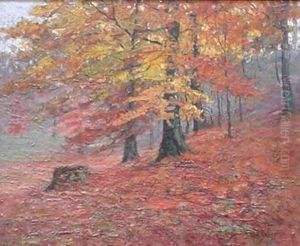George M. Baker Paintings
George Melville Baker was an American playwright, publisher, director, and actor, pivotal in the landscape of 19th-century American theater. Born in 1832, Baker's contributions spanned various facets of the performing arts, but he was most renowned for his prolific work as a playwright. Over the course of his career, Baker penned hundreds of plays, many of which were geared towards amateur theater groups, making the joy and craft of theater accessible to communities far and wide.
Baker's early life and education set the stage for his expansive career in the arts. Though detailed records of his early education are scarce, it is evident that Baker had a natural inclination towards literature and drama from a young age. This passion would lead him to Boston, a cultural hub in the United States, where he would eventually make significant contributions to the local theater scene.
In addition to his work as a playwright, George M. Baker was also a significant figure in the publishing industry. He founded the publishing house Baker's Plays, which specialized in plays for amateur and educational settings. This endeavor not only solidified his commitment to making theater accessible but also ensured that his works, and those of others, would be distributed and performed across the country.
Throughout his career, Baker was known for his comedic touch and his ability to craft characters and scenarios that were relatable and engaging to a wide audience. His plays often explored themes of social and moral values, reflecting the cultural and societal nuances of his time. Despite the vast number of plays he wrote, Baker also found time to act and direct, bringing his creations to life on stage and nurturing the talents of fellow actors and playwrights.
George M. Baker's legacy extends beyond his written works. Through his efforts in publishing and his dedication to amateur theater, he played a crucial role in democratizing the arts, making it possible for people from all walks of life to participate in and appreciate the craft of theater. He passed away in 1921, leaving behind a rich legacy that continues to influence the world of amateur theater to this day.
